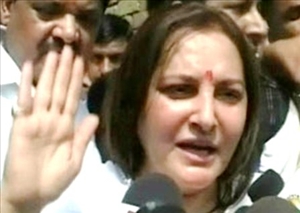
Lucknow, Mar 12: Expelled Samajwadi Party (SP) Lok Sabha member Jaya Prada, it appears, has learnt from West Bengal Chief Minister Mamata Banerjee on how to deal with prying journalists.
Following in Mamata's footsteps, Jaya Prada also threatened to slap a journalist.
Jaya Prada, a Lok Sabha member from Uttar Pradesh's Rampur constituency, was speaking to reporters at Deoria, about 325 km from here, on Tuesday when she suddenly lost her cool and threatened a local scribe.
“Ek lafa doongi abhi” (I will give you a slap), the MP threatened the scribe, apparently irked over persistent queries about her return to the SP. “Tumko buddhi hai ya nahin...galat baat mat karo...mujhe party se nikal diya hai” (Do you have any sense?...Don't talk rubbish..I have been expelled from the party), she shouted at the top of her voice when asked if she would consider returning to the SP.
The actor-turned-politician threatened to slap the scribe when he persisted with the question. She, however, earlier termed SP supremo Mulayam Singh Yadav her father and UP Chief Minister Akhilesh Yadav her brother.
Jaya Prada had been expelled from the SP along with former party general secretary Amar Singh. After their expulsion, the duo had floated Lok Manch, which had put up candidates in the last year's Assembly polls in the state.
It, however, could not win any seat. There were unconfirmed reports that Jaya Prada was looking to join the BJP .
The MP had come to Deoria to meet the wife of the slain Uttar Pradesh Deputy Superintendent of Police Zia-ul-Haq and offer her condolences to her.




Comments
Add new comment